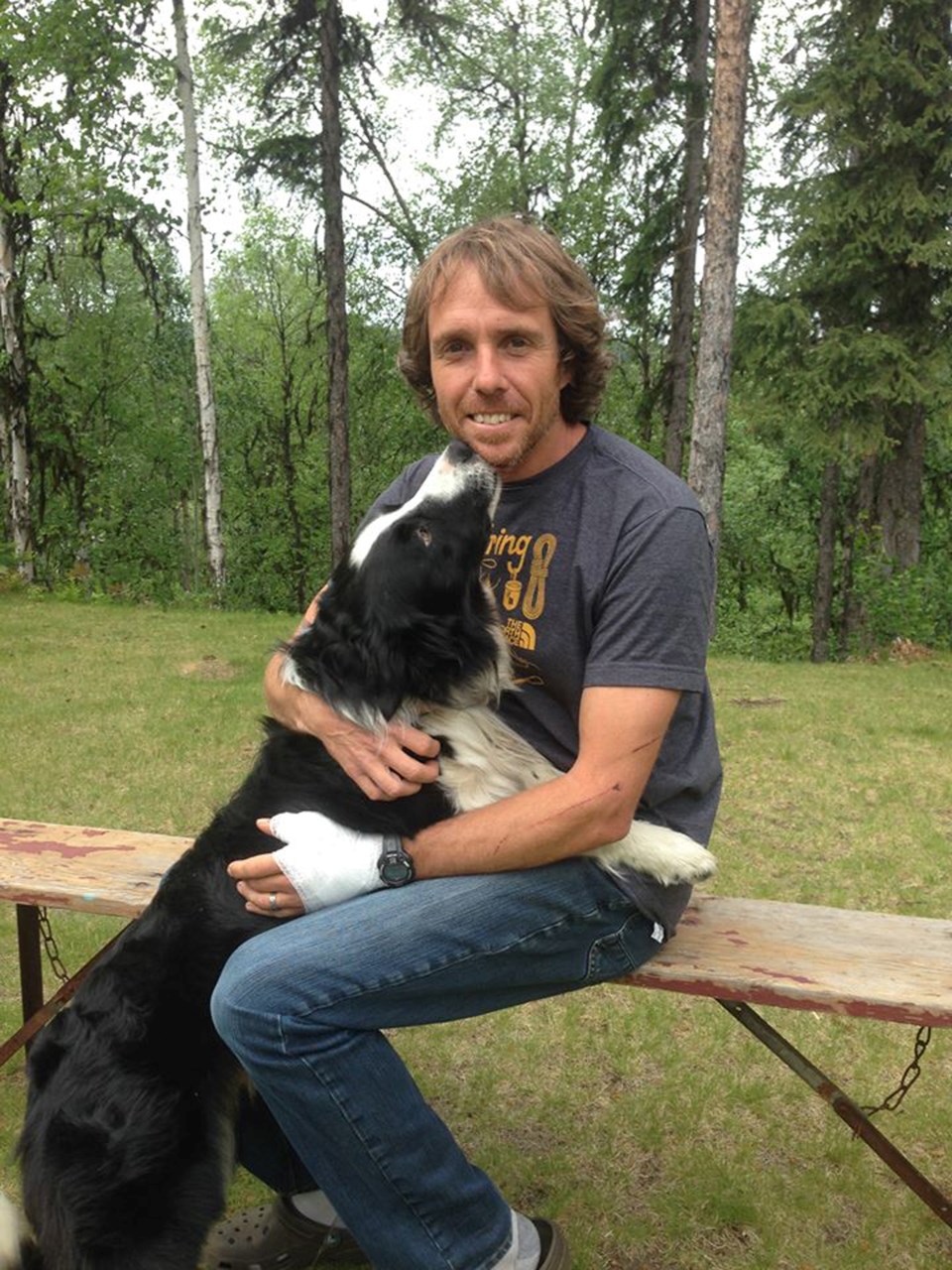Reid Roberts has every intention of being ready for his next ultra-marathon. But, between now and the Fat Dog 120 Trail Race, set for mid-August in the Manning Park region of the province, he has some healing to do.
Roberts, 46, was attacked by a mother black bear while on a training run at Forests for the World on the afternoon of May 17. Roberts and his three-year-old male border collie, Pacer, were able to mostly hold off the bear but Roberts sustained an injury to his left hand during the incident. That night, he received 16 stitches to close a gash near his thumb and everything seemed to be OK. He was given some antibiotics and pain medication and went home.
Three days later, Roberts went for a follow-up appointment with his surgeon, Dr. Christine Kurz. She asked him how his thumb was feeling, and his answer was "numb." The numbness indicated nerve damage, and Roberts was on the operating table that night. When he awoke, he was told not only was there nerve damage but a detached metacarpal between his thumb and index finger. As well, one to two inches of nerve fibre leading to his thumb was gone and, as such, couldn't be repaired.
Roberts was scheduled to have a soft cast replaced with a hard cast on Friday morning. After some healing time, he'll have to go back for more surgery.

The timing of that procedure, and what it will entail, isn't certain at this point, Roberts said. The initial plan was to take a nerve from the top of a foot and attach it to his thumb. However, with his 120-mile race on the horizon, he isn't keen about having a nerve removed from one of his feet. So, potentially, a nerve from the inside of an elbow could be used, or he could delay surgery until after his race.
"She (Dr. Kurz) was explaining to me while I was coming out of surgery so I was pretty drugged up and didn't really have my wits together to ask questions," Roberts said on Thursday.
"Right now, I can't run - it just hurts too much," he added. "Any kind of movement, or if I drop my hand down straight, as soon as the blood flows to it, it just aches."
Roberts started ultra-marathon running in 2010 and estimates he has competed in 15 to 20 races. He has been very successful, and a huge part of that success comes from all the training time he puts in.
While training, Roberts runs almost exclusively on trails and sees bears on a regular basis. On the afternoon of May 17, the bear that attacked him was about 50 metres away from the Forests for the World parking lot and came at him from some willows alongside the trail. Roberts had little time to react, but started yelling and waving his hands to try to get the bear to back away. She didn't.
Roberts is still unclear what happened next, but he ended up on the ground, lying on his back, with the bear swatting at him. Roberts kicked at the bear to try to keep her away, and then Pacer - who was not on a leash - came at her, barking and biting. The bear briefly went after Pacer but turned quickly to Roberts again. However, Pacer kept biting at the bear and, this time, she turned and started chasing him. Roberts tried to climb a tree, fearing the bear may come back, but she didn't, and the attack was over.
Later, conservation officers tracked down and killed the bear. Two cubs were tranquilized and relocated to a wildlife sanctuary in Smithers.

Roberts has been the target of much criticism on social media networks and finds that "kind of frustrating.
"People are making all these assumptions about me not being bear-aware," he said. "I run between 4,000 and 5,000 kilometres a year, just about all on trails - that's year-round. I've got so many hours logged in the bush. I worked in the bush prior to this. I'm not naive when it comes to bears. I've come across so many bears, and the fact that I've never had a serious bear encounter until now sort of proves the fact that I'm not an idiot out there."
Roberts wasn't carrying bear spray but said he wouldn't have had time to pull it out and use it anyhow.
In the future, however, he said he will pack bear spray with him.
"If I know I'm going solo, I'll take it with me," he said. "One reason we go out on the trails is to get away from the noise so throwing a bear bell on the dog is not something I'll do."
Roberts added that experts have stated bear bells aren't effective.
"Bears are deterred by human noise, not noise in general," Roberts said.
"Most of the time I am running in groups or with someone else but, yeah, I'd do the bear spray and just get into the habit of hooting and hollering the second (I) step off the road, literally. But people's view is that basically you've got to be yelling the entire time. So if I go out for a three- to six-hour run, every five seconds I've got to yell? Or every 10 seconds or one minute? Maybe I go 20 minutes and I don't yell and I come around a corner and I run into a bear. And I could have been yelling the whole time prior to that. These are the things - it's out of your control. So yes, I'll take preventative measures but I'm not going crazy and also not choosing to not run in the trails."
Jeff Hunter, who has been training with Roberts ever since the latter took up ultra-marathon running, said there was nothing Roberts could have done differently in this particular incident.
"I think this one was pretty unavoidable, given the circumstances - just how close the bear was when he encountered it and how close it was to the parking lot," Hunter said. "Certainly having stuff like bear mace can help, but it wouldn't help in this situation.
"We run into bears every time we run," he added. "And we're careful."
Roberts is convinced the attack would have had a much more serious outcome if not for Pacer's actions. Hunter, meanwhile, said there are pros and cons to taking dogs out on runs.
"Some dogs will provoke the bear and run back to you," he said. "Some dogs, especially if you train them right, won't. They'll just give you that extra hundred yards of alert, especially for moose in the winter. They'll bark and smell it and see it way before you will, so now you've got several hundred yards and you've got time to react.
"I won't run without dogs in bear country," he added.
The attack on Roberts has also sparked debate on whether dogs should be leashed or not.
"For me, if your dog is the kind of dog that runs back to you, or will provoke the bear, then leash it," Hunter said. "But if you've got your dogs trained so they won't do that - if they're just going to alert you and stay back - then I think it's better to be unleashed because they'll be further ahead of you. And you'll hear that bear or moose. You'll have that extra 10 seconds and be able to use your mace."
A few weeks before Roberts was attacked, Hunter was out with his three sons and two unleashed dogs and they had their own bear encounter.
"(The dogs) alerted me to a bear that was probably 150 yards out, in a field in that fence-line above UNBC way, right where everyone walks," Hunter said. "The dogs gave me the alert and that bear charged from a good 150 yards out. It was like fight or flight. I had my three boys and I can outrun them, so I stood my ground. The boys spread out beside me and the dogs stayed back but barked, and the bear broke off its charge and we avoided that area. I'm pretty sure that might have been the same bear (that attacked Roberts), and the dogs really helped in (our) situation."
Roberts remained remarkably calm during his run-in with the bear and said he hasn't been having flashbacks.
"I don't feel like it wasn't a big deal, but actually I try to force myself to have that image of this bear over top of me, but more to sort of piece together what I was doing and what happened," he said. "But I definitely don't have those nightmares that you would think I might have. It's been fine."



